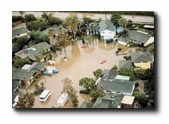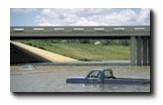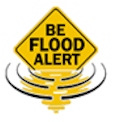|
Heavy rains can quickly lead to flooding. Floods have a different set
of challenges to prepare for than other severe weather events.
 Well
in advance of flooding conditions, assess your chances of being affected
by a flood. A call to the town or county clerk is a good way to find
out if you live in a flood plain. Well
in advance of flooding conditions, assess your chances of being affected
by a flood. A call to the town or county clerk is a good way to find
out if you live in a flood plain.
Before a flood arrives, you should have an evacuation
route planned; know how long it will take to evacuate your area and
build in time to account for others evacuating at the same time.
A homeowners policy
doesn't automatically cover damage from flooding, and you can't
simply purchase flood insurance as an endorsement to your policy
like you might expect. Instead, you must purchase a separate
flood insurance policy through an insurance company that
participates in the National Flood Insurance Program. Or
contact us for details.
|
You should carefully examine your need for flood insurance
according to the flood threat as determined by the Federal Emergency
Management Agency (FEMA) for your area. Generally, homeowners insurance
does not cover damage done by flooding. It's a mistake to believe that
flood insurance isn't necessary because of federal disaster aid. Often,
federal aid comes in the form of a loan that has to be paid back.
FEMA points out that $50,000 worth of damage done to
a home worth $100,000 can be financially devastating. While paying the
typical flood premium of $324 a year may seem steep, not having the
insurance after a flood is more costly. FEMA estimates that getting
a loan to repair $50,000 damage can cost you $3,732 a year for 20 years
as you repay the loan.

Getting your house in order
Prior to evacuation, you can prepare your home. Moving
furniture and other valuables to an upper floor can help protect them
from water damage.
Never cross a road flooded in water
If you live near a river or creek, be alert during any
heavy rain. It is not uncommon for a flash flood to sweep down a river
and catch nearby residents by surprise.
 When
the time comes to evacuate, it is paramount that you never cross a road
covered in water. People die every year during floods because they attempt
to cross washed-out roads and are swept away by the current. According
to the Ohio Committee for Severe Weather Awareness, even if you drive
a sport utility vehicle, you shouldn't attempt to cross because it's
difficult to gauge the water depth as well as the current. When
the time comes to evacuate, it is paramount that you never cross a road
covered in water. People die every year during floods because they attempt
to cross washed-out roads and are swept away by the current. According
to the Ohio Committee for Severe Weather Awareness, even if you drive
a sport utility vehicle, you shouldn't attempt to cross because it's
difficult to gauge the water depth as well as the current.

Learn More...
Overview
| Understanding The
Basics | Types Of
Insurance | Coverage
Amounts
Choosing A
Policy | Filing
A Claim | Other
Types Of Insurance | Home
Safety Tips
Planning
Concerns | Home
Glossary

Please Note: The
information contained in this Web site is provided solely as a source of
general information and resource. It is a not a statement of
contract and coverage may not apply in all areas or circumstances. For a complete
description of coverages, always read the insurance policy, including
all endorsements.
|


 Well
in advance of flooding conditions, assess your chances of being affected
by a flood. A call to the town or county clerk is a good way to find
out if you live in a flood plain.
Well
in advance of flooding conditions, assess your chances of being affected
by a flood. A call to the town or county clerk is a good way to find
out if you live in a flood plain. When
the time comes to evacuate, it is paramount that you never cross a road
covered in water. People die every year during floods because they attempt
to cross washed-out roads and are swept away by the current. According
to the Ohio Committee for Severe Weather Awareness, even if you drive
a sport utility vehicle, you shouldn't attempt to cross because it's
difficult to gauge the water depth as well as the current.
When
the time comes to evacuate, it is paramount that you never cross a road
covered in water. People die every year during floods because they attempt
to cross washed-out roads and are swept away by the current. According
to the Ohio Committee for Severe Weather Awareness, even if you drive
a sport utility vehicle, you shouldn't attempt to cross because it's
difficult to gauge the water depth as well as the current.